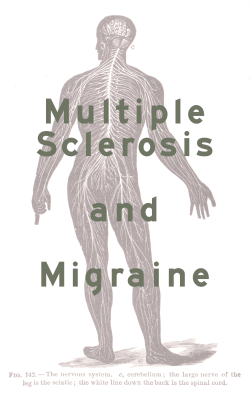MS and Migraines: New Research
 The relationship between MS and migraines, and, in fact, MS and headaches in general, is well known. But new research is shedding light on the link between the two.
The relationship between MS and migraines, and, in fact, MS and headaches in general, is well known. But new research is shedding light on the link between the two.
Multiple sclerosis, commonly known as MS, is a disease of the brain and spinal cord. The National Multiple Sclerosis Society (USA) defines it this way:
Multiple sclerosis (MS) involves an immune-mediated process in which an abnormal response of the body’s immune system is directed against the central nervous system (CNS), which is made up of the brain, spinal cord and optic nerves. The exact antigen — or target that the immune cells are sensitized to attack — remains unknown, which is why MS is considered by many experts to be “immune-mediated” rather than “autoimmune.”
Definition of MS
Although it isn’t the norm for those with MS to have a significant increase in headaches, people with MS do seem to be more susceptible. But what kinds of headaches, and why?
According to an article published in the Italian journal Neurological Sciences, the most commonly reported headache types reported by MS patients are migraine without aura and tension-type headaches.
According to a study published this month (Headaches in multiple sclerosis: Cross-sectional study of a multiethnic population.) from the The Keck School of Medicine of the University of Southern California, it’s migraine that is the most common of all. Treatments and socioeconomic status don’t seem to make a difference, but the migraine symptoms are more common among women, especially those who have had MS for a long time.
Migraine is then co-morbid with MS. It’s not necessarily the case that one “causes” the other, but they could also have a common cause or triggers.
However, there is increasing concern that migraine and other headache conditions could actually be an early sign of MS. This would be a rare case, so there’s no need for everyone with migraine to start worrying about MS. But it is yet another reason to see your doctor if you’re experiencing any new headache symptoms.
A report in 2015 highlighted the MS and migraines connection again, suggesting that status migrainosus, a debilitating migraine attack lasting for more than 72 hours, could be an early sign of MS. This report was based on the case of one patient only. But when preventative and abortive medications were not helping, an MRI began the trail of clues that finally led to the multiple sclerosis diagnosis.
Another report a year earlier disclosed the case of a man who had cluster headache attacks as the only early symptom of MS.
Once again, it is important to report any new symptoms to your doctor, whether you’ve been diagnosed with migraine or MS or not. If you are already an MS patient, managing migraine directly and MS directly with current treatments can improve your quality of life significantly.
Although you may need to treat each disease individually, there are times when your doctor may find a treatment that will help with both or avoid a treatment which may worsen symptoms of either MS or migraine.
For more information, see:
- Multiple sclerosis Overview (Mayo Clinic)
- Migraine is comorbid with multiple sclerosis and associated with a more symptomatic MS course
- Treatments and therapies (Multiple Sclerosis Society UK)
- Stabbing Headache – Could it be MS?
